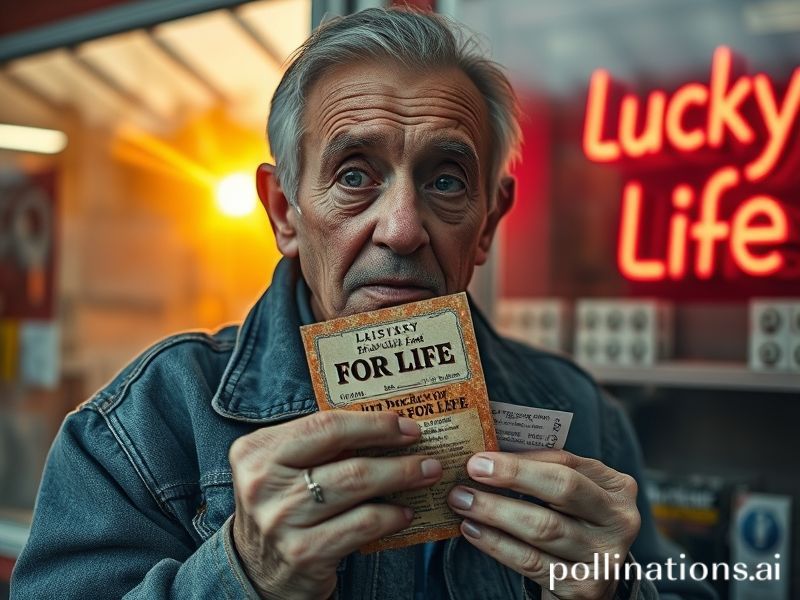Lucky for Life Goes Global: How a $25K-Annuity Fantasy Conquered the Planet—and What It Says About Us
Lucky for Life: A Global Lottery Where the House Always Wins—But So, Occasionally, Do We
By Dave’s Locker International Desk
From the neon-soaked kiosks of Manila to the hushed kiosks of Reykjavik, the same phrase is whispered like a secular prayer: “Lucky for Life.” It’s the brand name of an American lottery whose annuities now echo from Lagos to Lima, thanks to offshore betting apps, crypto-friendly “syndicates,” and the universal human talent for confusing probability with destiny.
At first glance, the game is charmingly modest: win a million dollars, get $25,000 a year until you die or the sun explodes, whichever comes first. Yet the slogan has become a global Rorschach test. In Jakarta, it’s a meme template for impossible traffic jams (“Stuck again—lucky for life!”). In Warsaw, opposition politicians deploy it sarcastically after another energy-price hike. Even the Kremlin’s English-language channels have adopted the phrase, captioning photos of oligarchs on yachts with the same two words, as if irony were an export commodity.
The mechanics are American, but the metaphysics are planetary. A 30-year-old nurse in Nairobi who buys in via a VPN is, strictly speaking, gambling on the Connecticut Lottery; spiritually, she’s wagering against every structural unfairness she’s ever known. Meanwhile, the European Central Bank frets that Italians are now swapping government bonds for lottery tickets denominated in dollars—an act that would make Dante relocate the usurers to an extra circle.
Statistically, you’re more likely to be reincarnated as Beyoncé’s microphone stand than to hit the top prize. Yet the fantasy scales beautifully. In India, where 1.4 billion people already treat cricket odds as a national pastime, Lucky for Life apps have become the polite cousin to satta markets. The Reserve Bank’s latest white paper notes that remittances from the Gulf are increasingly routed through lottery wallets instead of traditional hawala, because nothing says “I love you, Mom” like a JPEG of a golden ticket.
The darker punchline? Even the winners discover gravity. Take the Vietnamese fisherman who netted a runner-up prize through a Dubai-based syndicate last year. His $390,000 lump sum arrived just in time for the dong to depreciate 8% and his brother-in-law to launch a crypto shrimp farm that now exists only as a Discord server. “Lucky for life,” he told local television, smiling the tight smile of a man who has learned that cash flow and blood flow are not synonyms.
International regulators have responded with the usual circus. The EU wants to classify lifetime annuities as “debt instruments issued by fate,” triggering Basel IV capital requirements. Washington, ever subtle, is debating whether to withhold 30% from non-resident winners, because nothing deters foreign optimism like extra paperwork. China simply banned the apps, then launched a state-sanctioned version whose slogan translates roughly to “Moderately Prosperous for Life,” proving that even communism enjoys a rebrand.
Still, the appeal endures because it reframes the existential joke. Life expectancy, climate collapse, and the price of avocados are all trending in the wrong direction, but somewhere a phone buzzes with the news that a Bolivian rideshare driver just secured $365,000 guaranteed. For one asynchronous moment, entropy feels negotiable.
And so the planet keeps clicking “Buy Ticket.” Not because we’re stupid, but because the alternative—accepting that compound interest and compound disasters are the only sure things—requires a stoicism in short supply. In that sense, Lucky for Life is the most honest product ever marketed: it sells hope at exactly the price of hopelessness, plus a small service fee.
Conclusion: Whether you’re in São Paulo traffic or a Siberian gulag town with one working streetlight, the game offers the same bargain. You trade a few units of your local currency for the right to imagine a different timeline—one where the universe flips the bill for your groceries until death do you part. The odds remain laughable, the house remains a palace, and yet humanity keeps laughing along, because the joke is on all of us, together, forever. Lucky for life, indeed.







